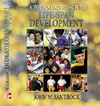 |  Life-Span Development: A Topical Approach John W. Santrock
The Life-Span Perspective Introduction
Learning Objectives1.Explain the importance of studying life-span development. |
 |  |  | 2.Describe the history of interest in the life-span perspective and indicate how contemporary concerns have arisen from previous views. |
 |  |  | 3.Describe the seven basic characteristics of the life-span perspective. |
 |  |  | 4.Discuss the nature of development as a pattern of movement or change occurring throughout the life span. |
 |  |  | 5.Define and distinguish between biological processes, cognitive processes, and socioemotional processes. |
 |  |  | 6.Understand the major developmental periods from conception to death. |
 |  |  | 7.Understand the three major developmental issues (nature and nurture, continuity and discontinuity, stability and change). |
 |  |  | 8.Understand, compare, and contrast the key development theories, including: - Freud's psychoanalytic theory versus Erikson's psychoanalytic theory
- Piaget's theory of cognitive development versus Vygotsky's sociocultural cognitive theory and the information processing approach
- Behavioral theories, including Pavlov's classical conditioning, Skinner's operant conditioning, and social cognitive theory
- Ethological theories
- Bronfenbrenner's ecological theory
- Eclectic theoretical orientation
|
 |  |  | 9.Define and distinguish between theory, hypotheses, and the scientific method, and understand the different research measures used by developmental psychologists, including: - observation
- interviews and questionnaires
- case studies
- standardized tests
- life-history records
- physiological research and research with animals
- correlational research
- experimental research
- time span of the research
|
 |  |  | 10.Understand the standard ethics of developmental research. |
|



 2002 McGraw-Hill Higher Education
2002 McGraw-Hill Higher Education